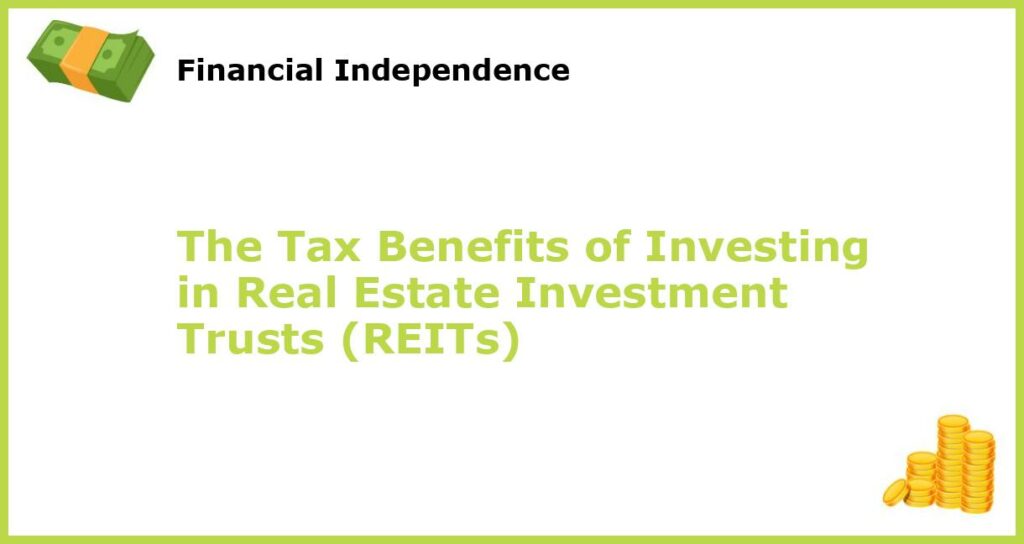Investing in real estate may seem like a daunting task, with the perceived hassle of managing properties and the large upfront investment required to purchase a single property. However, that need not be the case. Real Estate Investment Trusts (REITs) offer individual investors the opportunity to invest in income-producing high-quality real estate properties without the need to purchase the properties themselves. These companies own and operate several rental properties, such as office buildings, apartment complexes, shopping centers, and hotels, and investors get a share of the dividends generated from the tenants’ rent payments and property appreciation. In this article, we discuss some of the tax benefits of investing in REITs.
What are Real Estate Investment Trusts (REITs)?

As previously mentioned, REITs are companies that own and operate several properties that generate rental income. By buying shares in a REIT, investors can diversify their portfolio and reduce overall risk. Instead of investing in one specific property, investors can own a portion of a portfolio of properties owned by several REITs, which provides different diversification opportunities. Moreover, you can hold shares in several REITs that own several types of real estate properties in different geographic locations, further spreading the risk. This diversification makes REITs an attractive investment option compared to directly investing in a single real estate property.
Tax Benefits of REITs

REITs enjoy unique tax benefits that make them an attractive investment option for some investors. REITs are exempted from paying federal income tax provided that they distribute 90% of the income generated from rent payments in the form of dividends to shareholders. As a REIT investor, you will only be taxed on the dividends you receive, which are subject to different tax rates depending on the holding period. Additionally, REITs can also qualify for tax deductions on real estate depreciation, management fees, and repairs, which can lower the tax bill further.
Passive Income

Another benefit of investing in REITs is the consistent passive income stream they provide. REITs typically pay dividends quarterly or monthly, making them popular with investors seeking regular income streams. This feature positions REITs as an ideal investment option for retirees or those seeking to supplement their income without taking on the hassle of property management directly.
Liquidity

Investing in REITs offers investors a high level of liquidity thanks to the fact they’re listed on stock exchanges. Investors can buy and sell REITs quickly and easily, offering a higher level of liquidity compared to direct investments in real estate without worrying about managing or selling physical properties. This aspect makes REITs an accessible way to invest in property without requiring significant initial investment or management responsibilities.
Lower Investment Threshold

The lower investment threshold is another benefit of investing in REITs. Investing in real estate usually requires a significant equity investment, making it inaccessible to many investors. However, with REITs, a much lower initial investment usually allows investors to invest in the real estate portfolio. The minimum investment amount for some REITs can be as low as a few hundred dollars.
Inflation Hedge
REITs provide a viable hedge against inflation. Real estate prices typically increase with inflation, and REITs own and operate real estate. Therefore, dividends and earnings from the REITs could also increase with inflation. Investors could thus benefit from REITs’ potential to keep their returns in line with inflation rates.
Professional Management
REITs usually employ professional management teams to manage, maintain and operate the properties within the portfolio, which can be a plus for investors. This relieves individual investors of the responsibility of managing the properties, resulting in fewer headaches and more time on their hands. With professional management, the REIT can operate smoothly, and investors can be confident that their investment is operated by seasoned professionals.
Sustainable Investment
In recent years, there has been more focus on sustainability, and investors can make informed decisions to invest in REITs that prioritize sustainability. Investors can choose to invest in REITs that prioritize environmental, social, and governance (ESG) initiatives that align with their values and beliefs. Thus, investors can be confident that their investment choices align with their standards and beliefs.
Conclusion
Real Estate Investment Trusts (REITs) provide investors with a variety of advantages including valuable tax advantages, diversification, passive income, liquidity, access to professionally managed properties, lower investment threshold, and an effective inflation hedge. REITs present an opportunity for investors to invest in high-quality real estate properties without the hassle of property management or the need for a large initial investment, making them a viable investment option for those seeking to supplement their income or diversify their portfolio.







